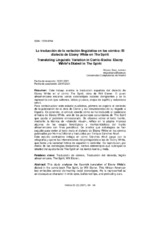Mostrar el registro sencillo del ítem
La traducción de la variación lingüística en los cómics: El dialecto de Ebony White en The Spirit
| dc.contributor.author | Sanz Jiménez, Miguel | |
| dc.date.accessioned | 2023-01-24T09:59:57Z | |
| dc.date.available | 2023-01-24T09:59:57Z | |
| dc.date.issued | 2022 | |
| dc.identifier.issn | 1579-9794 | |
| dc.identifier.uri | http://hdl.handle.net/10396/24564 | |
| dc.description.abstract | Este trabajo analiza la traducción española del dialecto de Ebony White en el cómic The Spirit, obra de Will Eisner. El joven afroamericano encarna varios estereotipos raciales denigrantes y se lo representa con ojos saltones, labios gruesos, orejas de soplillo y naturaleza servil. Para contextualizar este estudio cualitativo, primero se explora el contexto de la publicación de la obra de Eisner y las circunstancias de su llegada a España. En concreto, el artículo aborda cómo se ha traducido al castellano el habla de Ebony White, uno de los personajes secundarios de The Spiritque ayuda al justiciero enmascarado. Se observa cómo el texto fuente, mediante la técnica de «dialecto visual», refleja en la página impresa algunos de los rasgos fonológicos y morfosintácticos del inglés afroamericano con fines paródicos. Se analiza qué estrategias se han seguido para verter al texto meta el dialecto de Ebony White en los cómics publicados por Norma Editorial y traducidos por Enrique Sánchez Abulí. Este estudio contrastivo indaga en cómo Sánchez Abulí juega con la ortografía y opone las intervenciones del protagonista a las de Ebony White, que habla una variedad ficticia de español no estándar. Se reproducen, por medio delas estrategias traductoras, ciertos estereotipos que subrayan la otredad del ayudante de The Spiriten los textos fuente y meta. | es_ES |
| dc.description.abstract | This study analyzes the Spanish translation of Ebony White’s dialect in the comic-book The Spirit, by Will Eisner. This African-American boy embodies several demeaning racial stereotypes. He is represented as an obsequious character in wide eyes, ballooned lips, and protruding ears. Trying to contextualize this qualitative study, the first step is to explore the publishing context of Eisner’s works and the circumstances of theirpublication in Spain. Specifically, this paper focuses on how Ebony White’s dialect has been translated into Spanish, ashe is one of the supporting characters who helps the masked vigilante. It is observed how the source text’s pages portray, thanks to the «eye-dialect» technique, some of the phonological and morpho-syntactic features of Black English in a parodical tone. This contribution examineswhich strategies have been used to render Ebony White’s marked dialect into the target comic-books published by Norma Editorial and translated by Enrique Sánchez Abulí.This contrastive studysheds some light on how Sánchez Abulí plays with spelling and opposes the protagonist’s lines to Ebony White’s, as he speaks a fictional variety of non-standard Spanish. Thanks tothetranslation strategies, certain stereotypes underlining the otherness in The Spirit’s sidekick are reproduced in both source and target texts. | es_ES |
| dc.format.mimetype | application/pdf | es_ES |
| dc.language.iso | spa | es_ES |
| dc.publisher | UCOPress | es_ES |
| dc.rights | https://creativecommons.org/licenses/by/4.0/ | es_ES |
| dc.source | Hikma 20(2), 69-94 (2021) | es_ES |
| dc.subject | Traducción de cómics | es_ES |
| dc.subject | Traducción del dialecto | es_ES |
| dc.subject | Inglés afroamericano | es_ES |
| dc.subject | The Spirit | es_ES |
| dc.subject | Will Eisner | es_ES |
| dc.subject | Translation of Comics | es_ES |
| dc.subject | Translation of Dialect | es_ES |
| dc.subject | Black English | es_ES |
| dc.title | La traducción de la variación lingüística en los cómics: El dialecto de Ebony White en The Spirit | es_ES |
| dc.title.alternative | Translating Linguistic Variation in Comic-Books: Ebony White’s Dialect in The Spirit | es_ES |
| dc.type | info:eu-repo/semantics/article | es_ES |
| dc.relation.publisherversion | https://www.uco.es/ucopress/ojs/index.php/hikma/index | es_ES |
| dc.rights.accessRights | info:eu-repo/semantics/openAccess | es_ES |

